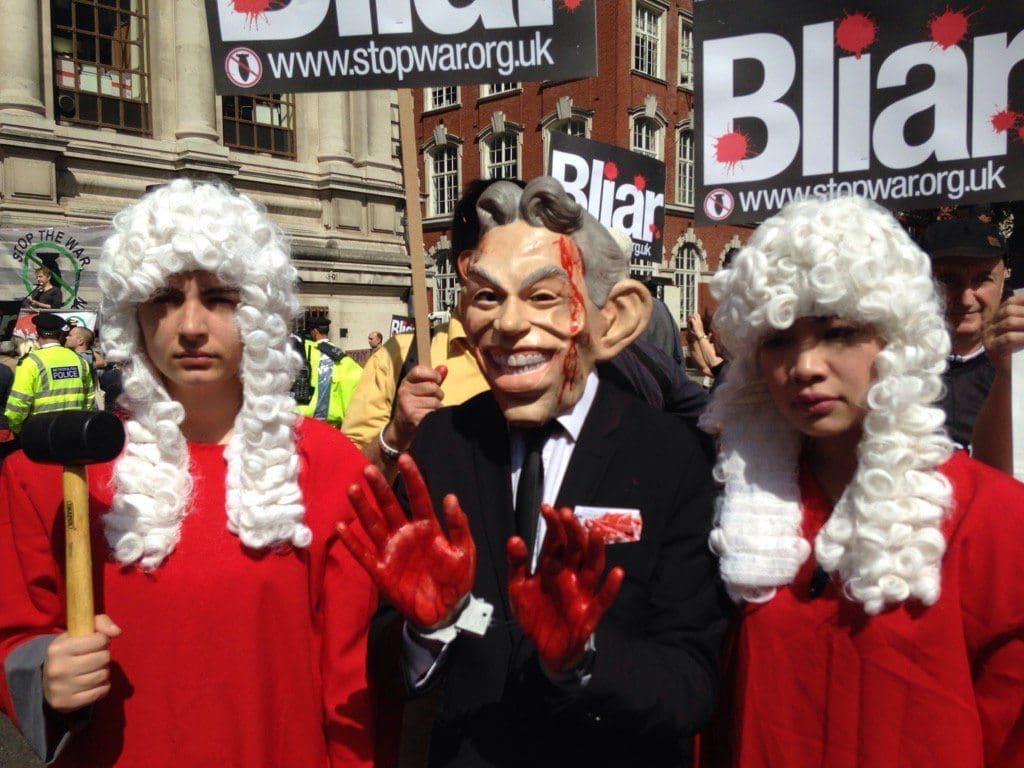On 3 July, at least 281 people were killed and hundreds of others injured in the biggest terrorist attack of 2016 so far. But because this massacre took place in the Iraqi capital of Baghdad, it went very much under the radar of most western media outlets. With the Chilcot inquiry bringing Iraq into public discourse again this week, however, it seems completely appropriate to echo the damning judgement given by one Iraqi citizen on the 2003 US-led invasion of his country.
On 9 April 2003, champion weightlifter Kadhim al-Jabbouri took a sledgehammer to the towering bronze statue of Saddam Hussein in Firdous Square, Baghdad, just hours before US-led forces entered the city. Al-Jabbouri once fixed Hussein’s motorbikes, but after Hussein’s Ba’ath regime executed 14 of his family members, he refused to do any more work for the dictator. He soon ended up in jail as a result.
Better under Saddam Hussein?
In spite of having very good reasons to celebrate the fall of Ba’athism in Iraq (along with many other Iraqis), says BBC Middle East editor Jeremy Bowen, al-Jabbouri now:
blames the invaders [i.e. the US-led coalition] for starting a chain of events that destroyed the country
Having spoken to the emblematic sledgehammer-wielding citizen, Bowen speaks of how he quickly:
realised it was not going to be liberation, but occupation. Then he hated the corruption, mismanagement and violence in the new Iraq. Most of all he despises Iraq’s new leaders… He longs for the certainties and stability of Saddam’s time.
In al-Jabbouri’s own words:
Saddam has gone, and we have one thousand Saddams now… It wasn’t like this under Saddam… We didn’t like him, but he was better than those people… Saddam never executed people without a reason… There was no corruption or looting… You could be safe.
Saddam Hussein was not afraid to use force to keep himself in power, and led Iraq into disastrously destructive wars against both Iran and Kuwait. But since the 2003 invasion of Iraq, the country has seen potentially a million civilians murdered in the midst of sectarian conflicts which quickly spiralled out of control in the power vacuum following Hussein’s defeat. It is more than fair to say that the country has seen few days of peace in the last 13 years.
A citizen’s personal Chilcot inquiry
When asked what he’d do if he met Tony Blair, al-Jabbouri said:
I would say to him ‘you are a criminal’, and I’d spit in his face
And to Blair, George W. Bush, and the whole US-led coalition, he would say:
You killed the children of Iraq. You killed the women and you killed the innocent… you are criminals and you should be brought to justice.
A reviled dictator may have been overthrown back in 2003. But invading western forces also dissolved the Iraqi army and state without a real plan for rebuilding the country, past privatising state resources and securing the passage of oil out of Iraq. As Bowen insists, the US-led military coalition simply:
improvised – and made matters worse.
Before the invasion, he says, “jihadists were not in Iraq” and “Shia and Sunni Muslims, whose sectarian civil war started during the occupation, could co-exist”. After the Iraqi army had been dismantled, however, the insufficient western troops found it impossible to stop the growing resistance as ideologically-fuelled foreign fighters “poured across open borders” to make the most of local anger.
Now, just days after Iraq’s deadliest single terrorist attack in almost a decade added hundreds of names to the toll of hundreds who had already been murdered in 2016, the horrific legacy of the invasion of Iraq is more visible than ever:
- Global terrorism has skyrocketed since the invasion of Iraq.
- Daesh (Isis/Isil) – which was born out of resistance to western occupation in Iraq – and other similar Wahhabi groups are responsible for the majority of non-state terrorism in the world today.
- Most of the victims are Muslim civilians, with Iraqis in particular bearing the brunt of these indiscriminate attacks. In fact, Iraq is among the five countries which currently suffer the most from global terrorism.
In the words of our weightlifting friend Kadhim al-Jabbouri, the 2003 invasion of Iraq may have overthrown Saddam Hussein, but it also spawned a “thousand Saddams”. So whatever western investigations into the invasion reveal, Iraqis and citizens throughout the Middle East know exactly where the blame lies for the region’s current instability. And out of respect for the millions of civilians who have had their lives cut horrifically short in recent years as a result, the war criminals responsible for sowing the seeds of so much death and destruction must be brought to justice.
Get involved!
Stay tuned for more at The Canary on the Chilcot inquiry in the next few days.
Featured image via WikiCommons, WikiCommons, and Jing Ulrich/Wikimedia Commons





















